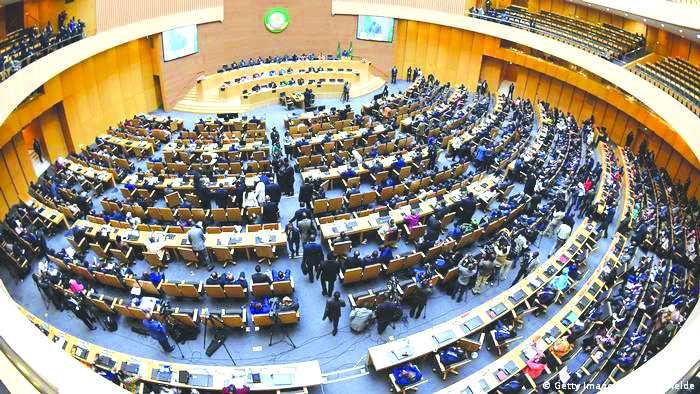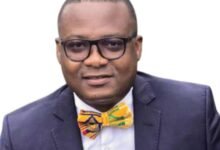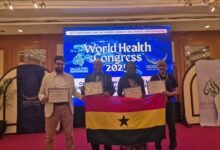THE BIRTH OF THE AFRICAN UNION (2)

The story so far:
GHANA, under President Kwame Nkrumah. selflessly gave Guinea ten million pounds sterling – a princely sum worth about 200 million pounds today, when France left Guinea in a peremptory manner, leaving the Guinea treasury empty. Now read on:
The money aside, Nkrumah and President Sekou Toure of Guinea shook the African continent still further when they announced the formation of a “Ghana-Guinea Union” of states which, they said, would serve as “the nucleus” of an African union of states, which other African countries could later join, if they liked.
For never before had two independent African states voluntarily decided to join together, although (of course) several “nations” had been forcibly brought together under the roof of a single nation, during the military conquests that marked the colonial period.
However, the step the two countries took was largely symbolic, for Ghana and Guinea did not share common frontiers that they could pull down; nor did they possess common ports where customs duties could be harmonised; nor were there any other concrete steps they could take, immediately, to make the “union” an effective and practical proposition.
Worst of all, one country spoke English and the other French – hardly the easiest way of uniting two countries. Yet the idea, as such, was imaginative and immensely appealing, and was hailed in many parts of Africa. In fact, Mali soon joined the union. and was rewarded with a loan of about 5 million pounds sterling by Ghana.
Efforts were actually made by the three countries to cooperate politically and economically, where possible. They sent “resident ministers” to each other’s country. And Ghana took another initiative when it acquired new Ilyushin-18 aircraft from the Soviet Union, with which it was able to introduce Ghana Airways flights to Conakry and Bamako. This improved transportation in West Africa, generally, by enabling passengers from the two countries to connect to flights to other West African countries, as well as to Europe and elsewhere.
Trade also began to pick up between the three countries – meat from Mali, in particular, began to be flown into Ghana as air cargo, and was seen in some Ghanaian cold-stores. But alas, by late 1960, Nkrumah and Sekou Toure – both headstrong personalities – had somehow fallen out and the union was tottering. No announcement was, however, forthcoming on the nature of the disagreement that had torn them apart.
Indeed, I myself only became aware of it by accident, when Kojo Addison, the censor whom Dr Nkrumah had planted in the Radio Ghana newsroom (where I was working as a news editor) began surreptitiously to take news items that mentioned Guinea or Sekou Toure out of our news bulletins! It was a crass act of intolerance
that was, unfortunately, typical of the emotional manner in which international politics was often pursued in Ghana at the time. It is to the credit of President Sekou Toure that he ignored the sometimes sour relationship between Nkrumah and himself, and magnanimously gave Nkrumah a home in Guinea, when Nkrumah was overthrown in 1966.
The Nkrumah-Toure disagreement may well have happened because by 1960, there were serious political tensions in Africa, that had begun to make the continent “sleepwalk” into splitting into two blocs (reflecting broadly, in a distorted form, the two blocs that constituted the countries engaged in “The Cold War”).
One African “bloc” became known as the “Monrovia Group” and the other, the “Casablanca Group”. Most of the members of the Monrovia Group were drawn from an earlier group called the “Brazzaville Group” that was formed by mainly pro-French countries. Initially, the Group was known as the “Afro-Malagasy Union” or, from its French initials, UAM.
The countries in the “Brazzaville Group” were Cameroon, Congo-Brazzaville, Cote d’Ivoire, Dahomey (now Benin), Gabon, Upper Volta (now Burkina Faso), Madagascar, Mauritania, Niger, Central African Republic, Senegal, and Chad. Later, the Group became more influential, when it was expanded to include Ethiopia, Liberia, Nigeria, Sierra Leone, Somalia, Togo, Tunisia, and Congo (which became Congo-Kinshasa after the death of its first Prime minister, Patrice Lumumba).
The “Casablanca Group” emerged in 1961 and comprised Algeria,
Egypt, Ghana, Guinea, Libya, Mali, and Morocco (for a short period). They were often labelled as the “radical group” (in contrast, the label “conservative ” was applied by lazy journalists to the Monrovia Group!) The labels were clearly a misnomer, for by no stretch of the imagination could Morocco, for instance, which was a “conservative” monarchical regime, be described as “radical” or “anti-imperialist”.
Clearly, both Groups were alliances of convenience: it was politically unwise – as far as domestic politics were concerned – to appear “isolated” on the African political scene. Hence, one adopted friends not necessarily because one shared a common political philosophy with them, but because they were available, or not regarded as a threat to oneself. Or they happened to have the same foreign friends!
It was not only Nkrumah who was disheartened by the existence of the Monrovia and Casablanca Groups in Africa. President Sekou Toure of Guinea (a member of the Casablanca Group) was also unhappy and he took steps to link up with Ethiopia’s Emperor Haile Selassie to try and organise a conference of the foreign ministers of the two groups, preparatory to a summit of their heads of state.
When Nkrumah heard of this, he was apparently irritated. Why should his ally, Sekou Toure appear to be trying to steal his thunder as the unacknowledged “father of African unity”? So he set his own secret diplomatic moves in motion, to get the Monrovia and Casablanca Groups to merge and form a common organisation. To accomplish this, Nkrumah dispatched one of his most trusted aides, Kwesi Armah (better known as Ghana’s high commissioner in London), to Liberia to see President William Tubman, who was
widely respected as one of the “old wise men” of Africa. (Liberia was one of the first African countries to be visited by Nkrumah after Ghana had achieved its independence in 1957).
TO BE CONCLUDED
By CAMERON DUODU






